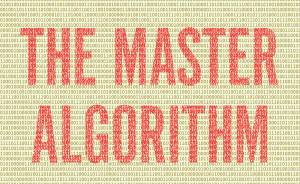Pedro Domingos' The Master Algorithm - How the Quest for the Ultimate Learning Machine Will Remake Our World is an interesting and thought provoking book about the state of machine learning, data science, and artificial intelligence.
Categorizing, classifying and clearly representing the ideas around any rapidly developing/evolving field is hard job. Machine learning with its multi-faceted approaches and ubiquitous implementation is an especially challenging topic. To write about it in a comprehensive yet easily understandable (aka non-jargon-ridden-hand-waving) way is definitely a great accomplishment.
One thing I really enjoyed about this writing is how the ML taxonomy and classification works; even for the people who have been in industry for a while, it is hard to create such meaningful distinctions and clusters around ideas.
“Each of the five tribes of machine learning has its own master algorithm, a general-purpose learner that you can in principle use to discover knowledge from data in any domain. The symbolists’ master algorithm is inverse deduction, the connectionists’ is backpropagation, the evolutionaries’ is genetic programming, the Bayesians’ is Bayesian inference, “and the analogizers’ is the support vector machine. In practice, however, each of these algorithms is good for some things but not others. What we really want is a single algorithm combining the key features of all of them: the ultimate master algorithm. For some this is an unattainable dream, but for many of us in machine learning, it’s what puts a twinkle in our eye and keeps us working late into the night.”
Starting with the question of are you rationalist or an empiricist, and extended this analogy to five tribes of machine, author has also challenged the notion of "intelligence" in a very direct manner against. By stating that this skeptical knowledge engineer's dogma that AI cannot "beat" humans is based on an 'archaic' Minsky/Chomsky school of thought; the variants of '“poverty of the stimulus" arguments are irrelevant for all practical intents and purposes. The outstanding success of deep learning is a proof to the contrary. Author has answered most of the 'usual' argumentum ad logicam in chapter 2 in which he paraphrase that the proof is in the pudding. From autonomous vehicles to sentiment analysis, Machine Learning / Statistical learners work, and hand-engineered expert systems with human experts don’t scale;
...learning-based methods have swept the field, to the point where it’s hard to find a paper devoid of learning. Statistical parsers analyze language with accuracy close to that of humans, where hand-coded ones lagged far behind. Machine translation, spelling correction, part-of-speech tagging, word sense disambiguation, question answering, dialogue, summarization: the best systems in these areas all use learning. Watson, the Jeopardy! computer champion, would not have been possible without it.
The book further elaborates by stating what author intuitively know (pun intended) as a frequently heard objection
...“Data can’t replace human intuition.” In fact, it’s the other way around: human intuition can’t replace data. Intuition is what you use when you don’t know the facts, and since you often don’t, intuition is precious. But when the evidence is before you, why would you deny it? Statistical analysis beats talent scouts in baseball (as Michael Lewis memorably documented in Moneyball), it beats connoisseurs at tasting, and every day we see new examples of what it can do. Because of the influx of data, the boundary between evidence and intuition is shifting rapidly, and as with any revolution, entrenched ways have to be overcome. If I’m the expert on X at company Y, I don’t like to be overridden by some guy with data. There’s a saying in industry: “Listen to your customers, not to the HiPPO,” HiPPO being short for “highest paid person’s opinion.” If you want to be tomorrow’s authority, ride the data, don’t fight it.
and of course the eureka! argument doesn't escape his criticism
And some may say, machine learning can find statistical regularities in data, but it will never discover anything deep, like Newton’s laws. It arguably hasn’t yet, but I bet it will. Stories of falling apples notwithstanding, deep scientific truths are “not low-hanging fruit. Science goes through three phases, which we can call the Brahe, Kepler, and Newton phases. In the Brahe phase, we gather lots of data, like Tycho Brahe patiently recording the positions of the planets night after night, year after year. In the Kepler phase, we fit empirical laws to the data, like Kepler did to the planets’ motions. In the Newton phase, we discover the deeper truths. Most science consists of Brahe- and Kepler-like work; Newton moments are rare. Today, big data does the work of billions of Brahes, and machine learning the work of millions of Keplers. If—let’s hope so—there are more Newton moments to be had, they are as likely to come from tomorrow’s learning algorithms as from tomorrow’s even more overwhelmed scientists, or at least from a combination of the two.
Whether you agree with the author's point of view or not, this is one of the best "big picture" reading on the state of machine learning and AI which will help you understand how things may shape up to be (or not) in next computing revolution.

